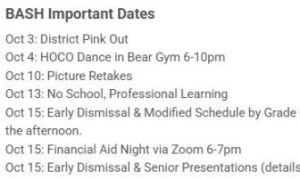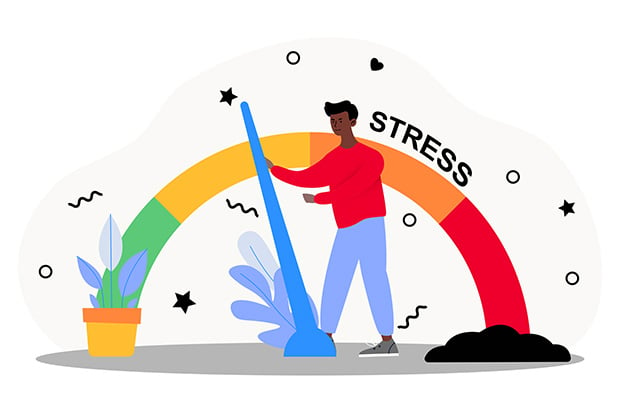Everyone has been in a situation where they can’t help but stress out, and are just thinking to themselves, ‘Why am I dealing with this?’ Stress is something that everyone goes through during their life, and while there are many good ways of handling it, not everyone knows how to.
What is stress? By definition, stress is a feeling of emotional or physical tension, stemming from any event or thought that causes students to feel overwhelmed, frustrated, angry, or nervous. It is a natural reaction to change or challenge, and therefore it is impossible to avoid it in its entirety.
What some people don’t realize is that stress can be utilized to benefit people if it is handled the right way. There are two types of stress, a positive type called Eustress, and a negative type called Distress.
Eustress is often derived from situations such as an upcoming job interview, taking a drivers test, dating, or graduation. While those are not the only causes of eustress, they are some of the ones that many students will likely go through during their time here at BASH.
Distress on the other hand, is often caused by much more serious and negative situations such as the impact of peer pressure, bullying, or death of a friend or relative. Distress is often sourced from unavoidable, or unpleasant situations. Due to this, stress is impossible to completely eliminate from life, but how it affects someone can be their choice.
Stress comes in 3 stages: Fight or Flight, Resistance, and Exhaustion. The fight or flight stage, or the body’s reaction to stress, involves the release of hormones cortisol and adrenaline. Fight or Flight is well known for being a survival instinct, and is commonly thought of like this: If you think you’re fast enough fly(flight). If not, be prepared to make a stand(fight).
Beyond just being a survival instinct, the response is a molecular cycle that involves the activation of a protein involved in everything from metabolism to memory. This stage includes physical changes as well, such as an increased heart rate, muscle tension, rapid breathing, and dilated pupils.
Stage two, the Resistance stage, is when the body begins to return to normal. The body will remain on high alert, until it knows the perceived threat is completely gone, but will begin to counteract the physiological changes that were caused by the stressor.
The sooner the stress is solved, the sooner the body can regain a state of internal balance. This is where it is made clear if someone understands how to handle stress. If the stress goes on for too long, that is when the body enters the third stage. If the stress is handled and stopped, the body does not enter the last stage.
Stage three, Exhaustion. This is when the body’s ability to maintain and keep up with normal functions begins to slip and break down. The immune system will be weakened, making the body more susceptible to diseases and illnesses, and if the body remains in this stage for too long, it can cause the person to pass away, due to the body no longer being able to function properly. How can a person prevent themself from ending up in this stage?
Everyone is different, and different things will help different people. Similar to that, different things will stress different people out. A new school year being one, especially for the incoming Freshman. A new building to learn the layout of can be stressful to anyone. There’s a lot of ways school can stress out both students and staff alike, and if someone doesn’t know where to start, these are a few strategies may help:
Dieting and Exercise: Everyone has heard the phrase ‘you are what you eat’. And in a way it’s true. If someone is putting toxins and unhealthy chemicals into their body, they are less likely to be able to deal with stress in a healthy way. A balanced diet can support the immune system, helping in the repair of damaged cells, and provides the body with the needed energy to cope with stressful situations.
Mindful eating is a practice which counteracts stress by encouraging deep breathing, and focusing on what is being eaten by chewing food slowly and making thoughtful meal choices. Mindful eating helps people realize if they are eating because of physiological hunger, or psychological turbulence.
Exercise doesn’t have to be a rigorous work out routine, it can be something as simple as a walk to clear the mind. While it may sound daunting at first, and may feel like more work than fun or relaxation, it can do wonders to help with the body.
Physical activity helps to lower blood pressure and stress hormone levels. Aerobic exercises increase breathing and heart rate, allowing more oxygen to reach cells throughout the body, helping to release tension in muscles, including the heart.
Meditation and Deep breathing: One response to stress is fast, shallow, and erratic breathing. Taking deep breaths can help stress, directly counteracting and stress response. Deep breathing can be done anywhere, and is a great way to help calm a student if they’re stressed before a presentation, performance, or test. The simple act of taking deep breaths causes the parasympathetic nervous system to kick in and help calm someone down. There are many different forms of meditation, but here is a playlist full of different meditation videos to try.
Journaling: Finding a healthy way to express oneself is one of the best ways to deal with any overwhelming emotion, making keeping a journal a helpful tool when managing mental health. It helps control body systems, and can improve someone’s mood by helping to prioritize problems, fears, and concerns. It provides an opportunity to talk positively about oneself and recognize negative behaviors or thoughts. Journaling for just a few minutes everyday, even if it’s done periodically throughout the day, can help track any symptoms, and recognize triggers to help someone better prepare for future situations.
Counseling/Talking to a loved one: While it may be obvious, talking to a professional, or even just a friend or family member, can be the most effective solution. Sometimes without realizing it, that small social connection can be all students need to feel better.
If it ever gets to a point that’s as serious as the Exhaustion stage of stress, talking to someone is one of the best ways for students to help themself. Even if it doesn’t seem like a big deal, talking to someone can majorly help a student through their problems, and help realize what the main cause truly is. There are resources here at BASH such as counselors and therapists if students ever need it.
There are plenty more strategies to try, but that was just a select few that could help and be easy for a student to try while getting back into the school year.
“The greatest weapon against stress is our ability to choose one thought over another.”
– William James



















